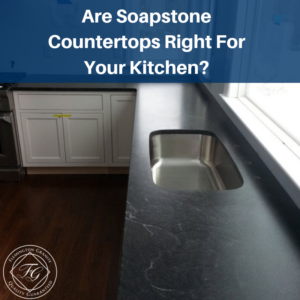
When you are remodeling your kitchen or in the process of building a new home, choosing the right countertop can be exciting but also very confusing. If you have decided on granite countertops, you may now be faced with deciding how thick your counter should be. These tips can help you choose the right countertop thickness for your needs.
Thickness Options
There are two standard thickness options for granite countertops. In the past, 2 cm slabs were the industry standards, but today, more homeowners are choosing 3 cm thicknesses instead. The main difference between 2 cm and 3 cm thicknesses is that 2 cm slabs involve extra work which could make your counters more expensive.
The reason for the added expense is that 2 cm granite requires a support layer for installation. The installer will also need to laminate an additional strip on the front facing for the edging of your counter. Because 3 cm slabs are 33 percent thicker, you don’t need plywood added under the granite or extra lamination. This makes your counters stronger and give a smoother appearance as there will not be an extra seam on your counters.
It is also possible to get 6 cm thickness which creates an eye-popping look. However, you will need to add plywood support and you will need to laminate the slabs to connect them. For many homeowners, the stunning look is worth the additional work.
Granite Overhang
Another factor you will need to include when choosing countertops is the overhang. The standard is 12 inches as that is the best width for sliding stools or other furniture under the counter. Depending on the size of your counter, you may also need to have corbels installed which are L-shaped brackets that support the overhang. If you will not have seating at your countertops, the standard overhang is between 1 and 1½ inches. This keeps crumbs or spills from falling into open drawers and makes the counter feel more natural when you stand against it.
Cabinets are Important
Your cabinets and your countertop must work together in order to create a kitchen that is not only functional and attractive, but will withstand the test of time. Cabinets must be level before granite counters can be installed. Although slight variances can be corrected by the weight of the granite, the difference must be slight. If the cabinets are too unlevel, the technician will be unable to install the countertops.
If you are considering granite counters or any other type of natural stone, contact us today to learn more about your options. Complete the easy form online or give us a call for more information.







